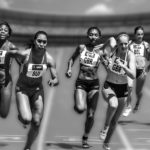Whether you’re an athlete and think you might need one, or you’re an aspiring fitness professional looking to learn more about the area of sports psychology, sports psychologists are becoming more and more popular in the world of health and wellness. Why is this? Who should be seeing one? What happens during a sports psychology session? Let’s find out!
Sports Psychology Defined
According to the American Psychological Association, sports psychology uses psychological insight and mental techniques to address lifestyle and performance issues faced by athletes. These issues range from performance barriers, social problems, issues with management, and self-limiting beliefs.
Sports psychologists can also assist other sports stakeholders, like sports coaches and families of professional athletes, do deal with issues that arise as a result of their loved ones taking part in the professional world of sport. Playing in the big leagues brings immense pressures and sports psychologists help athletes – as well as their families – deal with these in a positive way.
A Typical Sports Psychology Session:
Assessment
The first step in a sports psychology session is to assess exactly where the athlete or athletes are mentally. If it’s the very first session, sports psychologists might want to assess an athlete using a mental aptitude profile (MAP). This will reveal their psychological strengths and weaknesses. It highlights which areas require the most work.
Goal Setting
Once a sports psychologist has an idea of how an athlete is feeling and where their head is at, they’ll proceed to set specific goals to be achieved before the next sports psychology session. Athletes new to sports psychology will receive a ‘goal roadmap’ at this point. This plan shows the overall outcome that the athlete wants to achieve (like playing for the A team) and a timeline of steps required to get there.

Trifocus fitness academy – sports psychology session
Coaching
With a game plan in action, a sports psychologist will then share specific mental and emotional exercises with athletes. These are the techniques used to keep them in the zone, or to get them over that hurdle they’re facing in training. Some of these exercises are used when the athlete is exercising while others are used in-between performances during down time.
Practice
Once an athlete is given the mental and emotional exercises, they’ll need to practise them under observation. This is when the sports psychology session might move to the field or workout It’s a no-pressure environment where the athlete and the sports psychologist work on implementing psychological techniques in the heat of the moment.
Together with seeing a sports psychologist, an athlete must make sure that he does the basics in order to ensure that he conditions his body and eats cleanly in order to give themselves the fuel that they need in order to perform at their optimum.
In terms of diet, an athlete needs to make sure that they eat in a balanced manner. They need to eat from all five food groups and make sure that they don’t take in more of one nutrient than they need. Before a big meet or an important race, they will need to carbo-load so that they have enough energy to sustain themselves. However, this doesn’t mean that they need to go wild and eat all the pizza and pasta in sight! Athletes need to make sure that they eat the right types of carbs when they carbo-load (such as low GI carbs) which will release energy slowly into the blood stream so that they can have a sustained energy release throughout the race.